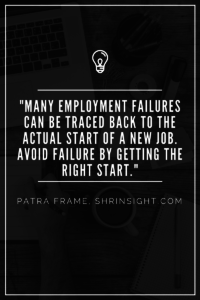INSIDE THE 
NEWS + ADVICE
7 Steps to Success in a New Cleared Job
 First impressions count in many facets of your career. That includes when you start a new job. Start your new position on the right foot to set the tone for your continued success.
First impressions count in many facets of your career. That includes when you start a new job. Start your new position on the right foot to set the tone for your continued success.
Here’s a list of pointers for that first week at a new job to get you off to a good start.
- Ask the office dress code before you start. Don’t rely on what you saw when you interviewed. You may have been there on an atypical day, and pick up the wrong signals as to what is expected. Ask your recruiter and your new supervisor what the office dress code is. What does “casual Friday” or “business casual” really mean? Ask. If in doubt, overdress and then you can scale back after you figure it out.
- Figure out your commute so you’re on time. Test drive your route ahead of time, preferably the same time as when you’ll be commuting. If that isn’t possible and you’re relying on Google Maps to tell you how long it will take, check Google maps during the time that you would be commuting vs another time of day. Check on more than one day too. You really don’t want to be late your first week if you can avoid it. My favorite quote: “A plan to be on time is a plan to be late.”
- Embrace your new beginning and be thankful. If you are psyched about your new job let others know about it. Sometimes in the name of being “professional” we forget enthusiasm. Other people are drawn to enthusiasm, so if you feel it let others know. You may reinvigorate them as well. In the confusion and nerves of your new job remember to say thanks to people who help you too, even if it’s simply pointing you to the bathroom. This is the time for you to build bridges. Enthusiasm, politeness and friendliness go a long way.
- Start building relationships, but don’t go overboard. Say yes to lunch invitations, happy hours, coffees and other casual interactions. Meet with others in your department and in related areas to learn more about the organization. You need to build relationships that will help you accomplish your goals and make you more effective long-term. But develop relationships with your colleagues first before going into great detail with them about your personal life.
- Ask questions before making pronouncements. Listen to others. Don’t immediately try to recreate your old job in your new job, or tell everyone what they’ve been doing wrong. You’re new. You may have been hired to revamp the organization, but get the lay of the land first. This is the time where you are building relationships of trust with your colleagues. And you may be tempted to throw out all those old files or emails that were given to you, but wait for several months. Then you’ll have a much better handle on what’s critical and what is not.
- Pay attention in orientation. You’ll learn many things in orientation, including information to help you make decisions that are critical to your financial future. Be in the moment and pay attention so you make smart, informed decisions. If you have questions, ask. It’s also a good time to meet other people who are new to the organization.
- Make sure you and your boss have the same goals. Do you know what is expected of you in the first three to six months? How will your boss determine whether you are succeeding? How is success defined in your job? When is your first performance review? If you didn’t nail these things down in the interviewing process, do so now. Or if you did, reconfirm them now.
Listen more than talk. You want to contribute and you will have the opportunity to do so…after you have more in-depth knowledge and a better understanding of the organization and the players.
This entry was posted on Tuesday, August 30, 2016 2:25 pm
